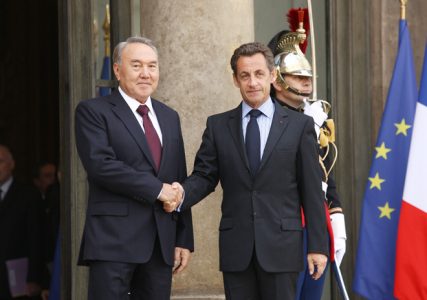Kazakhgate Investigation Reveals Bungling By French Officials - Dispatch Weekly
June 4, 2020 - Reading time: 5 minutes

Senior officials in President Nicolas Sarkozy’s administration were so convinced of their powers of influence that they bragged about changing the law in a foreign country in order to win a €2 billion defence contract for France.
The boastful claims unleashed a scandal known as “Kazakhgate” and have spawned multiple investigations into influence peddling, money laundering and corruption.
But now evidence has emerged from a Parliamentary investigation in Belgium that has thrown into doubt the claims of influence by Sarkozy’s officials.
According to a Parliamentary Inquiry Committee (PIC) report, the President of Kazakhstan had told Sarkozy that relations between their countries could be improved if a long-running Belgian investigation into the billionaire Patokh Chodiev was concluded.
Chodiev was helping the French to secure a helicopter and satellite deal with Kazakhstan worth €2 billion and Sarkozy’s officials offered assistance with Chodiev’s difficulties in Belgium in return. Chodiev and his partners had been accused of financial crimes in relation to Belgian property deals in the mid 1990s and the investigation had dragged on for 15 years without resolution.
The allegations were eventually settled in 2011 after Belgium introduced an extended plea bargain law (“transaction pénale”) that saw the Kazakh businessmen pay €20 million in return for the charges being dropped without any finding of guilt.
A media report in 2012 claimed that the Belgian plea bargain law had been passed after a campaign by French officials on behalf of Chodiev.
Jean-Francois Etienne des Rosaies reportedly sent an email to colleagues in the Sarkozy administration stating that the Belgian Minister of Justice had dropped the case against Chodiev. This decision followed lobbying by Armand De Decker, a Belgian senator who had been hired to help on the case.
In another email sent by des Rosaies, the Frenchman claimed that De Decker had amended the law to benefit Chodiev and that the Belgian senator had secured the support of the Ministers of Justice, Finance and Foreign Affairs.
These explosive claims resulted in widespread media coverage of the so-called “Kazakhgate” scandal and strained relations between France and Belgium.
In December 2016, 15 members of the Belgian Parliament began an investigation into the allegations. Their 16-month inquiry heard from 177 witnesses and produced a 500-page report.
The PIC’s conclusion was that the introduction of the plea bargain law had nothing to do with the Chodiev case and was not the result of political influence-peddling.
Claude Guéant, former chief of staff to President Sarkozy, said the French involvement was only to introduce Chodiev to a lawyer called Catherine Degoul, who took over the Belgian case. Degoul then hired Senator De Decker without Chodiev’s knowledge.

The PIC found that De Decker had approached Stefaan De Clerck, the Minister of Justice, about the Chodiev case but was rejected. De Clerck said: “Obviously a Minister of Justice does not intervene in such cases in any way.”
De Clerck described the claims made by Etienne des Rosaies as “purely fanciful”. Steven Vanackere, the Minister for Foreign Affairs, also dismissed the claims made by des Rosaies.
Patrick de Wolf of the Brussels Court of Appeal stated that the plea bargain law “had not been amended in any way with the aim of settling the cases against Mr Patokh Chodiev et al.” The PIC agreed and concluded that there had been no improper influence over the introduction of the law, which had been under discussion for five years before it was enacted.
The media allegations of French interference in Belgian law appear, therefore, to be based largely on the claims made by Etienne des Rosaies, who was portrayed as a “Walter Mitty” character during the PIC hearings.
Jean-Pierre Mazery, formerly Grand Master of the Order of Malta, who had worked with des Rosaies, described the Frenchman as having a “very strong need for recognition and for social status”.
Mazery added: “He tends to claim all the credit… sometimes this gets rather irritating for the parties who are really in control… he overdoes it and at some point people are getting annoyed with him.”
Des Rosaies, who has had a colourful career as a fixer for the French Government, appears to have done the one thing diplomats are supposed to avoid: he created an international incident by bragging and taking credit for events that did not happen.

DW Staff
David Lintott is the Editor-in-Chief, leading our team of talented freelance journalists. He specializes in covering culture, sport, and society. Originally from the decaying seaside town of Eastbourne, he attributes his insightful world-weariness to his roots in this unique setting.
